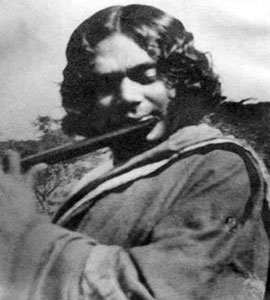Full name: Kazi Nazrul Islam
Nick name: Dukhu Mian
Born: 24 May 1899
Died: 29 August 1976
Birth place: West Bengal, India
Occupation: Poet, Song composer
Nationality: Bangladeshi
Genre: Bengali Renaissance
Period: Modern age
Spouse: Pramila Devi
Nick name: Dukhu Mian
Born: 24 May 1899
Died: 29 August 1976
Birth place: West Bengal, India
Occupation: Poet, Song composer
Nationality: Bangladeshi
Genre: Bengali Renaissance
Period: Modern age
Spouse: Pramila Devi
Kazi Nazrul Islam
Kazi Nazrul Islam is the national poet of Bangladesh who is
especially recognized as a Bidrohi Kobi (rebel poet) around the country.
Nazrul is a famous poet, musician and philosopher of Bangladesh. The
famous poet Nazrul’s writings
deal with the revolution of that period of British government. His
revolutionary attempt helped him to be a national poet of Bangladesh. He
has raised his voice against any kinds of fascism and oppression and
got popularity swiftly around the Indian Subcontinent. The writings
of Kazi Nazrul Islam deal with revolutionary appeal. Nazrul has a
strong voice against all kinds of bigotry including religious and
gender. He wrote many novels, songs and much literary term but he is
well known for his poems. Nearly four thousand songs were composed by
Nazrul these are collectively known as Nazrul geeti. In 1922, with the
publication of ‘Bidrohi’ he came to the limelight very swiftly. He had
been suffering from an unknown disease when he was 43 years old and lost
voice and memory. There is a suspect that British government applied a
slow poison in his body. Then Bangabandhu Sheikh Mujibur Rahman
brought him in Dhaka in 1972 along with his family. The national poet
of Bangladesh Kazi Nazrul Islam died four years later in Dhaka.
In 1933, Nazrul published a collection of essays titled "Modern World
Literature", in which he analyses different styles and themes of
literature. Between 1928 and 1935 he published 10 volumes containing 800
songs of which more than 600 were based on classical ragas. Almost 100 were folk tunes after kirtans
and some 30 were patriotic songs. From the time of his return to
Kolkata until he fell ill in 1941, Nazrul composed more than 2,600
songs, many of which have been lost. His songs based on baul, jhumur, Santhali folksongs, jhanpan or the folk songs of snake charmers, bhatiali and bhaoaia
consist of tunes of folk-songs on the one hand and a refined lyric with
poetic beauty on the other. Nazrul also wrote and published poems for
children.
In 1933, Nazrul published a collection of essays titled "Modern World
Literature", in which he analyses different styles and themes of
literature. Between 1928 and 1935 he published 10 volumes containing 800
songs of which more than 600 were based on classical ragas. Almost 100 were folk tunes after kirtans
and some 30 were patriotic songs. From the time of his return to
Kolkata until he fell ill in 1941, Nazrul composed more than 2,600
songs, many of which have been lost. His songs based on baul, jhumur, Santhali folksongs, jhanpan or the folk songs of snake charmers, bhatiali and bhaoaia
consist of tunes of folk-songs on the one hand and a refined lyric with
poetic beauty on the other. Nazrul also wrote and published poems for
children.
Nazrul's success soon brought him into Indian theatre and the then-nascent film industry. The film "Vidyapati"
("Master of Knowledge") was produced based on his recorded play in
1936, and Nazrul served as the music director for the film adaptation of
Tagore's novel Gora. Nazrul wrote songs and directed music for Sachin Sengupta's bioepic play "Siraj-ud-Daula".
In 1939, Nazrul began working for Calcutta Radio, supervising the
production and broadcasting of the station's musical programmes. He
produced critical and analytic documentaries on music, such as
"Haramoni" and "Navaraga-malika". Nazrul also wrote a large variety of
songs inspired by the ragaBhairav.
Nazrul's success soon brought him into Indian theatre and the then-nascent film industry. The film "Vidyapati"
("Master of Knowledge") was produced based on his recorded play in
1936, and Nazrul served as the music director for the film adaptation of
Tagore's novel Gora. Nazrul wrote songs and directed music for Sachin Sengupta's bioepic play "Siraj-ud-Daula".
In 1939, Nazrul began working for Calcutta Radio, supervising the
production and broadcasting of the station's musical programmes. He
produced critical and analytic documentaries on music, such as
"Haramoni" and "Navaraga-malika". Nazrul also wrote a large variety of
songs inspired by the raga Bhairav. Renowned Nazrul Sangeet/Geeti singers include Firoza Begum, Suprava Sarkar, Angurbala, Indubala, Anjali Mukerjee, Jnanendra Prasad Goswami, Nilufar Yasmin, Manabendra Mukherjee, Kanika Majumder, Dipali Nag, Sukumar Mitra, Dhirendra Chandra Mitra, Dhiren Basu, Purabi Dutta, Nashid Kamal, Ferdous Ara, Fatema-tuz Zohra, Jaheda Begum, Shahin Samad, Rahman Mehmud (Benu Bhai), Ramanuj Dasgupta and Susmita Goswami. Nazrul's poetry is characterised by an abundant use of rhetorical
devices, which he employed to convey conviction and sensuousness. He
often wrote without care for organisation or polish. His works have
often been criticized for egotism,
but his admirers counter that they carry more a sense of
self-confidence than ego. They cite his ability to defy God yet maintain
an inner, humble devotion to Him. Nazrul's poetry is regarded as rugged but unique in comparison to Tagore's sophisticated style. Nazrul's use of Persian vocabulary was controversial but it widened the scope of his work.
Info: http://www.biographybd.com, en.wikipedia.org
Info: http://www.biographybd.com, en.wikipedia.org


No comments:
Post a Comment